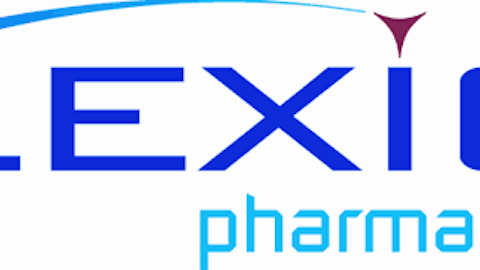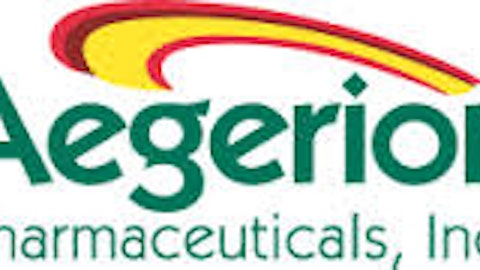Aegerion Pharmaceuticals, Inc. (NASDAQ:AEGR) is currently trading higher by 13% after having its price target raised to $90 by Canaccord – which is now the highest target on the stock. The stock is trading at $68.50 after a one-year 380% gain due to the recent FDA approval of its drug Juxtapid. However, I believe the stock has gotten ahead of itself, and that there is no basis for a $90 price target.
Reflection of Previous Analysis
Back on May 19, I wrote an article on Aegerion called “Too Many Questions Make This Thursday Mover A Sell.” Basically, the article walks the reader through all of the speculation that has created its large movement; including the company’s misleading statements regarding Juxtapid’s potential.
Juxtapid will be used to treat homozygous familial hypercholesterolemia. However, “rare cholesterol disease” is much easier when discussing the disease. My first article showed how the patient population for this disease is very scattered, as the company indicates it to be one size (3,000 total domestically) while the FDA estimates it to be significantly smaller (just 315 annual claims).
My conclusion from the previous article is that the true number of “rare cholesterol disease” is somewhere in the middle. When considering that there is already a drug on the market, Sanofi’s Kynamro, to treat the exact same condition I predicted peak sales to be $250 million for Juxtapid – which I believe is vital to assessing and valuing the company.
Valuing Biotechnology By Peak Sales
When I predict $250 million in peak sales – I mean just that – it is “peak sales” and very few drugs ever reach full potential.
With that said, I find Canaccord’s $90 price target very hard to assess. I immediately wondered, “What metric are they using?” According to Canaccord, Aegerion Pharmaceuticals, Inc. (NASDAQ:AEGR) will reach a market capitalization of $2.60 billion, which means that it’s currently trading at about 10 times peak sales potential.
When a biotechnology company has a newly approved product, the only way to accurately assess its outlook is by sales potential. At this point for Aegerion, there is no way to know Juxtapid’s eventual operating margins or how long it will take for the company to reach peak sales. Therefore, high-profile newly launched products and hyper-growth pharmaceutical companies are often valued based on their potential, or a lead product’s peak sales potential.
A Side-By-Side Comparison
If Aegerion Pharmaceuticals, Inc. (NASDAQ:AEGR)’s $90 price target is based on the peak sales of Juxtapid then Aegerion is one of the most expensive stocks in the biotechnology arena. With that said, I want to compare Canaccord’s target and Aegerion’s price/peak sales potential to that of other high-profile biotechnology companies.
| Company | Ticker | Price Target* | Firm | Lead Drug | Peak Sales (millions) | Target Valuation/Peak Sales Potential** |
|---|---|---|---|---|---|---|
| Aegerion Pharmaceuticals | AEGR | $90 | Canaccord | Juxtapid | $250 | 10.37 |
| Regeneron Pharmaceuticals Inc (NASDAQ:REGN) | $315 | Brean Capital | EYLEA | $4,000 | 7.71 | |
| Alexion Pharmaceuticals, Inc. (NASDAQ:ALXN) | $132 | Canaccord | Soliris | $5,000 | 5.15 | |
| Sarepta Therapeutics Inc (NASDAQ:SRPT) | $63 | Baird | Eteplirsen | $700 | 2.86 |
*top price target of all analyst outlooks
** Determined by multiplying price target by shares outstanding to find targeted market cap. The market cap is then dividend by the estimated peak sales potential.
For the most part, the drug that has the greatest sales potential also warrants the higher target valuation/peak sales ratio. There are only two exceptions.
The first exception is with Regeneron Pharmaceuticals. It trades at 7.71 times EYLEA’s peak sales while Alexion trades at 5.15 times Soliris’ peak sales. The reason this is significant is because Soliris has higher sales potential. However, Regeneron also has a larger pipeline, including 12 in its pipeline, and a Phase 3 cholesterol drug called Alirocuma that could reach sales in excess of $3 billion annually. Thus, Soliris has more peak sales potential than EYLEA – but Regeneron has a more significant pipeline – as Alexion’s pipeline is built around additional indications of Soliris.
The second exception is with Aegerion Pharmaceuticals, Inc. (NASDAQ:AEGR). The company is the most expensive of all when comparing peak sales to targeted valuations. Yet, Juxtapid has the lowest peak sales potential of any drug that is charted. Sarepta Therapeutics’ drug Eteplirsen has almost three times the sales potential of Juxtapid and its targeted valuation is only a fraction compared to that of Aegerion. Therefore, it is hard to determine why Canaccord insisted on issuing such a bullish price target.
Final Thoughts
Personally, I think Aegerion is setting itself up for major post-launch losses. Right now the stock is trading higher on momentum, and investors are losing sight of the drug’s limited sales potential. While Aegerion Pharmaceuticals, Inc. (NASDAQ:AEGR)management has raised Juxtapid’s price tag, I tend to lean more towards the FDA – and data that shows only 315 U.S. occurrences of homozygous familial hypercholesterolemia. Thus, I believe $250 million in revenue will be a tough feat for the company.
In biotechnology, sales compared to valuation is what ultimately creates value – and products that have larger sales potential warrant a more expensive valuation relative to sales. Aegerion Pharmaceuticals, Inc. (NASDAQ:AEGR) might in fact have a great product, and might in fact be a great company. However, we are not arguing these two points. We are discussing whether Aegerion’s price target of $90 is too expensive. Based on the comparisons that I have shown, there is little doubt that Canaccord’s $90 price target is way too excessive.
Brian Nichols is long SRPT. The Motley Fool has no position in any of the stocks mentioned.
The article A $90 Price Target for This Biotech! How’s It Figured? originally appeared on Fool.com.
Copyright © 1995 – 2013 The Motley Fool, LLC. All rights reserved. The Motley Fool has a disclosure policy.



